Child Prodigies in Indian Mythology
- April 11, 2022

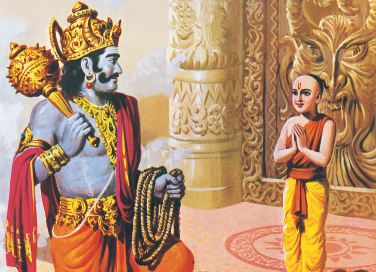
Child Prodigies in Indian Mythology
- April 11, 2022
By Srinidhi Murthy
Indian Mythology has interesting stories of child prodigies, whose devotion and determination made it possible for them to reach new heights. Here are the fascinating legends of some such children who achieved seemingly impossible tasks.
Ashtavakra was the son of Sage Kahoda and his wife Sujatha. One day, when Kahoda was teaching his disciples, he was interrupted by a voice that came from his wife’s womb. The voice corrected the chant that was mispronounced by Kahoda. Angered at being humiliated in front of his disciple, he cursed his unborn child to be born with eight deformities. As the date of his son’s birth approached, Kahoda went to King Janaka as he needed money for the birth of his child. Janaka told Kahoda that he would reward him if he defeated Bandhi. Bandhi was a scholar who remained undefeated in debates. The king also added that the sage would be drowned if he did not achieve success.
To receive more such stories in your Inbox & WhatsApp, Please share your Email and Mobile number.
Unfortunately, Kahoda was no match for Bandhi and was defeated. Soon after this event, Sujatha delivered a son. The child was named Ashtavakra due to his eight deformities. When Ashtavakra reached the age of twelve, he wanted to avenge his father by defeating Bandhi. Seeing the confidence and intelligence of the boy, Janaka permitted him to have the debate with Bandhi. To everyone’s surprise, Bandhi was easily defeated by the boy. Bandhi then revealed that he was the son of Varuna and that the true purpose of his challenge was to send sages from earth to perform a yagna for his father and not to drown them. Hearing this, the king and his courtiers rushed to the river where to their surprise, they saw all the sages emerge alive and well from the water. There, Ashtavakra had a joyous reunion with his father, who was overjoyed by his son’s success and cured his deformities.
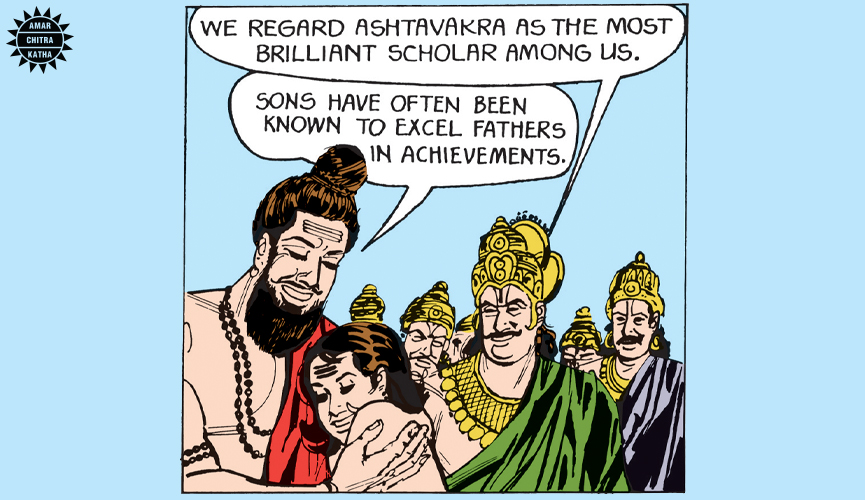
Dhruva was the son of King Uttanapada and his first wife Suneeti. Unfortunately, Uttanapada loved his second wife Suruchi more than his first wife and son. One day, Dhruva saw Uttama, the son of Queen Suruchi, sitting on his father’s lap. Filled with excitement, Dhruva ran toward his father to join his brother but Suruchi stopped him on his way and told him that he had no right to sit on his father’s lap. She also added that Dhruva should pray to Lord Narayana to be reborn as her son if he wanted to enjoy the same rights as Uttama. Hurt by the harsh words of his stepmother, Dhruva became determined to gain the favour of Lord Narayana. With his mother’s blessing, he reached Madhuvan forest and started his meditation by chanting the name of the Lord. Moved by the determination of Dhruva, Lord Narayana appeared before him.
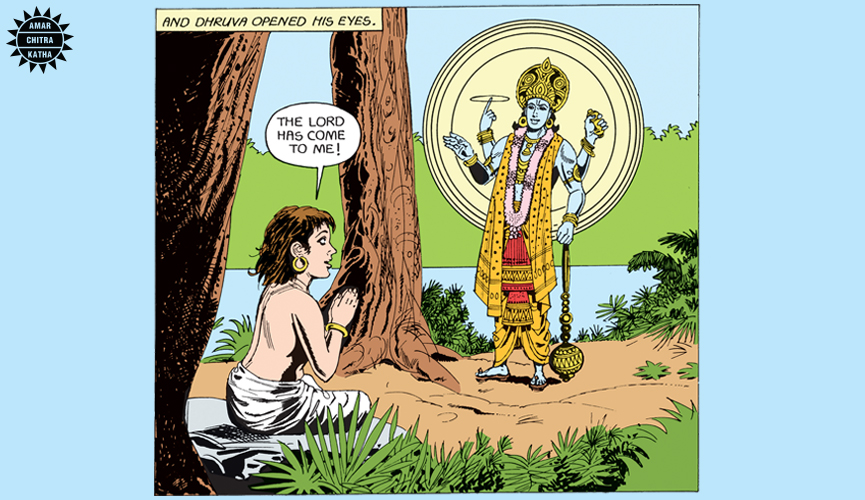
Narayana blessed Dhruva and told him that he would be a great king for 36,000 years and would have a permanent place in heaven. When Dhruva returned home, he was reunited with his joyful parents. A few years later, Uttanapada retired to the forest, after crowning Dhruva as the next king. The Dhruva Tara or the Pole Star is said to be Dhruva, in his place in heaven.
Prahlad was the son of the asura Hiranyakashipu. Hiranyakashipu’s brother had been slain by Vishnu and hence, the asura wanted to destroy Vishnu and his devotees as revenge. He performed severe penances to gain the boon of immortality from Brahma. When Brahma appeared before him, Hiranyakashipu asked that he should not die either by man or beast, during the day or night, indoors or outdoors, on earth or in the sky. After gaining the boon, the asura invaded heaven and drove the gods out of their abode. He became extremely powerful and started wreaking havoc on earth as well as in heaven. However, to his great dismay, his son Prahlad grew up as a great devotee of Vishnu.
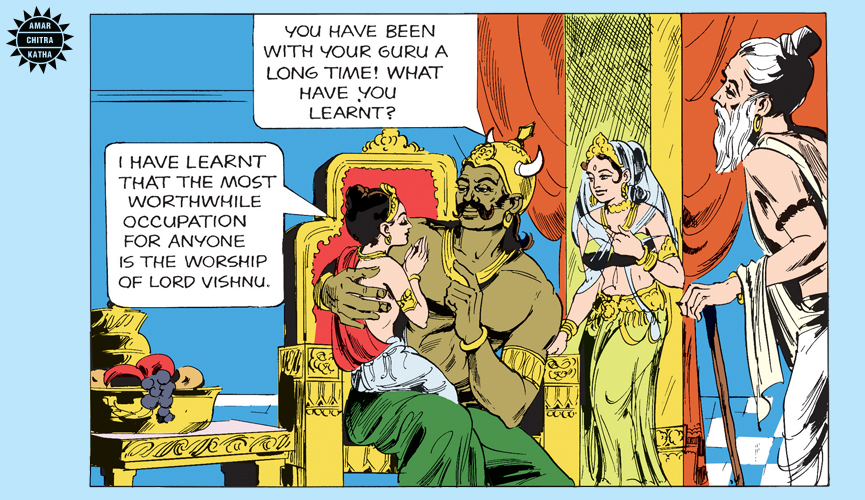
At first, Hiranyakashipu tried to change his son by instructing his teachers to change his mind. Days passed but Prahlad’s devotion towards Vishnu did not waver. Angered by his son’s insolence, Hiranyakashipu ordered his asuras to kill his Prahlad. The asuras tried to kill the child in many ways, but Prahlad remained unharmed by the blow of swords, the poison of serpents, blazing fire or the trample of mighty elephants. After his numerous failed attempts to kill his son, Hiranyakashipu called Prahlad and asked for his source of power. Prahlad calmly replied that Lord Vishnu was the source of his power. Angered by his words, Hiranyakashipu kicked the pillar and asked Vishnu to appear before him. Lord Vishnu emerged in the form of Narasimha, a half lion-half man. In the twilight hour, Narasimha killed Hiranyakashipu on the threshold of the courtroom. After the death of his father and with the blessings of Lord Vishnu, Prahlad ruled wisely and well for many years.
Nachiketa was the son of Sage Vajashrava. He was sent to a gurukula at the age of eight, where he received his education. Soon, Nachiketa was called back by his father to assist him in his upcoming Vishvajit Sacrifice, wherein an individual gave away all his possessions. When he reached home, Nachiketa noticed that his father was giving away the sick and old cows he possessed as his sacrifice. Nachiketa realised that the sacrifice would not be completed properly with such offerings. He, therefore, asked his father to sacrifice him instead. The sage was irritated by Nachiketa mocking his offerings. When Nachiketa asked him who the sage would sacrifice his son to, Vajashrava angrily told Nachiketa that he would give him away to Yama, the god of Death. Although Vajashrava immediately regretted his words, Nachiketa set out to fulfil his father’s words. He reached the abode of Yama and waited for him there for three days.
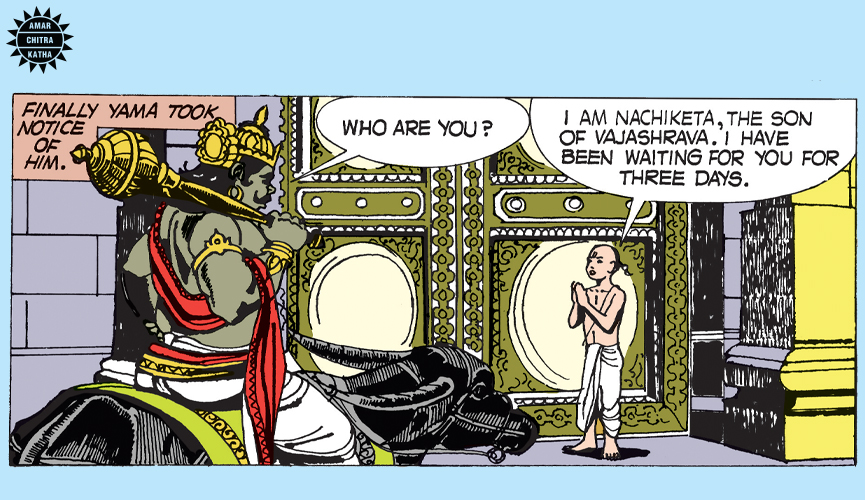
When Yama learnt that Nachiketa received no hospitality for three days, he offered him three boons to compensate for the mistake. As his first boon, Nachiketa asked Yama to grant his father peace of mind and happiness. In the second, he asked Yama to teach him a sacrifice that would grant him the ability to feel no hunger or thirst. Yama granted his two boons but was surprised when Nachiketa demanded that he reveal whether or not there is life after death, as his final boon. At first, Yama tried to offer other things to distract the boy but Nachiketa was keen only on getting an answer to his question. Seeing his determination, Yama felt obliged to answer the boy’s question. He explained that people who lived virtuous lives are able to realise their true selves, while those who chase pleasure get stuck in an endless cycle of rebirth. Yama then taught Nachiketa about the nature of the self and the correct manner of leading one’s life. Satisfied with his boons, Nachiketa returned home. As he grew older, many came to his hermitage to seek knowledge and guidance.
To receive more such stories in your Inbox & WhatsApp, Please share your Email and Mobile number.
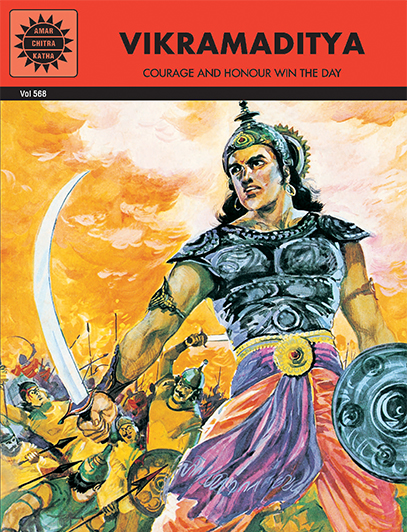
Comic of The Month
Vikramaditya
A jealous brother robbed him of his kingdom, his own courage won it back. Chandragupta Vikramaditya has a special place in history because he proved that the love of power is not all that is needed to create an empire. Also required is the love of a wise woman and good, old-fashioned honor.